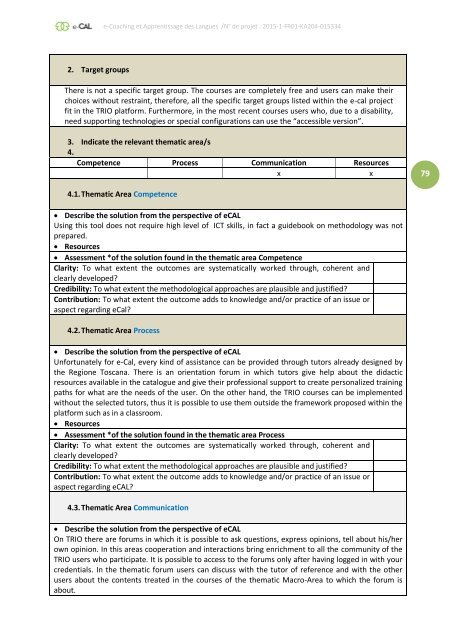e-CAL - e-Coaching et Apprentissage des Langues
The ERASMUS+ project e-CAL presents the result of an analysis of support methods in the case of language learning using web-based Open Educational Resources (OER).
The ERASMUS+ project e-CAL presents the result of an analysis of support methods in the case of language learning using web-based Open Educational Resources (OER).
You also want an ePaper? Increase the reach of your titles
YUMPU automatically turns print PDFs into web optimized ePapers that Google loves.
e-<strong>Coaching</strong> <strong>et</strong> <strong>Apprentissage</strong> <strong>des</strong> <strong>Langues</strong> /N° de proj<strong>et</strong> : 2015-1-FR01-KA204-015334<br />
2. Targ<strong>et</strong> groups<br />
There is not a specific targ<strong>et</strong> group. The courses are compl<strong>et</strong>ely free and users can make their<br />
choices without restraint, therefore, all the specific targ<strong>et</strong> groups listed within the e-cal project<br />
fit in the TRIO platform. Furthermore, in the most recent courses users who, due to a disability,<br />
need supporting technologies or special configurations can use the “accessible version”.<br />
3. Indicate the relevant thematic area/s<br />
4.<br />
Comp<strong>et</strong>ence Process Communication Resources<br />
x<br />
x<br />
79<br />
4.1. Thematic Area Comp<strong>et</strong>ence<br />
Describe the solution from the perspective of e<strong>CAL</strong><br />
Using this tool does not require high level of ICT skills, in fact a guidebook on m<strong>et</strong>hodology was not<br />
prepared.<br />
Resources<br />
Assessment *of the solution found in the thematic area Comp<strong>et</strong>ence<br />
Clarity: To what extent the outcomes are systematically worked through, coherent and<br />
clearly developed?<br />
Credibility: To what extent the m<strong>et</strong>hodological approaches are plausible and justified?<br />
Contribution: To what extent the outcome adds to knowledge and/or practice of an issue or<br />
aspect regarding eCal?<br />
4.2. Thematic Area Process<br />
Describe the solution from the perspective of e<strong>CAL</strong><br />
Unfortunately for e-Cal, every kind of assistance can be provided through tutors already <strong>des</strong>igned by<br />
the Regione Toscana. There is an orientation forum in which tutors give help about the didactic<br />
resources available in the catalogue and give their professional support to create personalized training<br />
paths for what are the needs of the user. On the other hand, the TRIO courses can be implemented<br />
without the selected tutors, thus it is possible to use them outside the framework proposed within the<br />
platform such as in a classroom.<br />
Resources<br />
Assessment *of the solution found in the thematic area Process<br />
Clarity: To what extent the outcomes are systematically worked through, coherent and<br />
clearly developed?<br />
Credibility: To what extent the m<strong>et</strong>hodological approaches are plausible and justified?<br />
Contribution: To what extent the outcome adds to knowledge and/or practice of an issue or<br />
aspect regarding e<strong>CAL</strong>?<br />
4.3. Thematic Area Communication<br />
Describe the solution from the perspective of e<strong>CAL</strong><br />
On TRIO there are forums in which it is possible to ask questions, express opinions, tell about his/her<br />
own opinion. In this areas cooperation and interactions bring enrichment to all the community of the<br />
TRIO users who participate. It is possible to access to the forums only after having logged in with your<br />
credentials. In the thematic forum users can discuss with the tutor of reference and with the other<br />
users about the contents treated in the courses of the thematic Macro-Area to which the forum is<br />
about.


